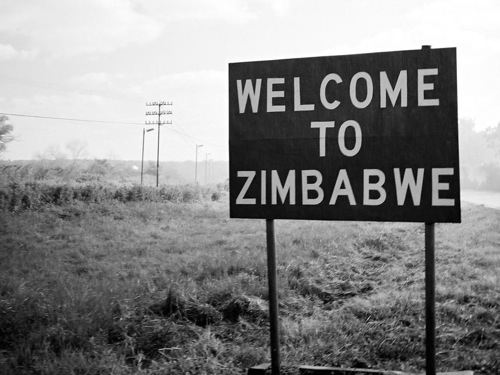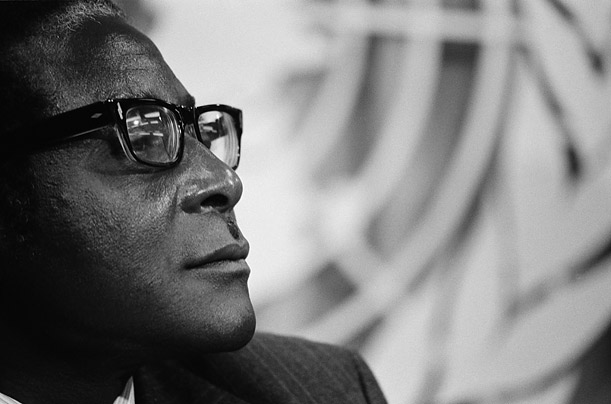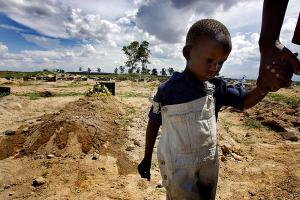Zimbabwe
ACAS Bulletin 80
Special Issue on the Zimbabwe Crisis - Two
 Our last Special Issue on the Zimbabwe Elections came out two weeks before the June 27th run-off presidential election. This was before opposition leader Morgan Tsvangirai of the MDC announced his decision not to contest the run-off election because of the extreme violence used against the MDC candidates, supporters, and alleged supporters. This issue of the ACAS bulletin is concerned with the aftermath of the elections of 2008, offering analysis of the outcome of the parliamentary election results of the March elections, the ways in which the political violence during May and June have fundamentally altered the possibility of a non-violent political dispensation in Zimbabwe, and, perhaps of most current interest for readers, the unfolding of “power sharing” negotiations that began with the September 11, 2008 signing of a Memorandum of Understanding between Mugabe’s ZANU(PF), Tsvangirai’s MDC-T, and a smaller splinter group led by Arthur Mutambara, the MDC-M.
Our last Special Issue on the Zimbabwe Elections came out two weeks before the June 27th run-off presidential election. This was before opposition leader Morgan Tsvangirai of the MDC announced his decision not to contest the run-off election because of the extreme violence used against the MDC candidates, supporters, and alleged supporters. This issue of the ACAS bulletin is concerned with the aftermath of the elections of 2008, offering analysis of the outcome of the parliamentary election results of the March elections, the ways in which the political violence during May and June have fundamentally altered the possibility of a non-violent political dispensation in Zimbabwe, and, perhaps of most current interest for readers, the unfolding of “power sharing” negotiations that began with the September 11, 2008 signing of a Memorandum of Understanding between Mugabe’s ZANU(PF), Tsvangirai’s MDC-T, and a smaller splinter group led by Arthur Mutambara, the MDC-M.
See also: ACAS Bulletin 79 (Spring 2008): Special Issue on 2008 Zimbabwe Elections | Read the complete PDF
Zimbabwe: MDC Had to Get In Or Change Course
By Clapperton Mavhunga | 1 February 2009
I was not surprised to see the MDC joining the Government of National Unity. In fact, I concluded so the moment that party president Morgan Tsvangirai decided to go home from Botswana earlier in the month. When an opposition party takes the option of armed struggle off the table and vests all its energies in an internal solution after all nonviolent strategies have failed, there is indeed no choice other than to participate in the GNU or sink into oblivion. The MDC National Council’s decision to participate in the GNU—whether an elopement with Zanu (PF) or traditional marriage where the festivities of a church ceremony are not the main issue but paying lobola—was merely a coup de grace. My verdict is that Mugabe had already tactically and strategically outwitted the opposition, from the very moment that the MDC agreed to participate in the talks. When you plunge into a crocodile-infested pool, make sure you know how to swim.
Zimbabwe: What does the GNU hold for the MDC?
By Clapperton Mavhunga | 1 February 2009
In a piece written before the opposition MDC joined Robert Mugabe’s Government of National Unity in Zimbabwe, MIT assistant professor Clapperton Mavhunga (also a Zimbabwean national), writes that “… if the MDC decides to go in, it must not do so blindfolded, otherwise it will seal its own fate. If it stays out, it must change course.”
Zimbabwe: “Reporting in a ‘culture of fear”
By ACAS | 31 January 2009
Link to nterview with freelance journalist Frank Chikowore who has worked for two newspapers in Zimbabwe, including The Nation and the Weekly Times, which was closed down in 2005.
What might a better US policy towards Zimbabwe look like?
By Terri Barnes | 31 January 2009
Obama’s inaugural remarks did seem in some direct way to be pointed towards Robert Mugabe: “To those leaders around the globe who seek to sow conflict or blame their society’s ills on the West, know that your people will judge you on what you can build, not what you destroy. To those who cling to power through corruption and deceit and the silencing of dissent, know that you are on the wrong side of history, but that we will extend a hand if you are willing to unclench your fist.”
Western calls have little impact on Zimbabwe
By ACAS | 21 January 2009

‘The international pressure on Robert Mugabe, Zimbabwe’s president, is growing, but there is no sign yet that the 85-year-old leader is any nearer to relinquishing control of a country that is plunging ever deeper into economic chaos and humanitarian crisis’, write Richard Lapper and Tony Hawkins in the Financial Times.
Mugabe’s Endgame
By Clapperton Mavhunga | 18 December 2008
Could it be possible that while the public, the press, and the international community were busy with cholera, the illegal regime in Harare actually declared a state of emergency under cover of a “national emergency” (ostensibly against cholera)? I may not be the only one seeing the reality that what has intensified is not the energy with which Mugabe is combating cholera, but, rather, abducting human rights activists collecting information on human rights abuses and MDC activists.
Anti-Imperialism and Schizophrenic revolutionaries in Zimbabwe
By Tamuka Chirimambowa | 18 December 2008
Robert Mugabe claims that the ghosts of colonialism have come to haunt Zimbabwe and caused unforetold suffering to Zimbabweans through western imposed sanctions, and with the MDC the west is the major culprit for calling for sanctions. This attempt to reinvent the political and economic history of Zimbabwe has been discussed in academic circles; thus, Professor David Moore notes the emergence of Agrarian nationalists or what Terence Ranger terms patriotic history. This illusion has informed many policy and position debates on Zimbabwe at regional and international fora as various interested stakeholders seek to unlock the Zimbabwe logjam. However this elisionistic interpretation of the Zimbabwe crisis has been allowed at the expense of Zimbabweans’ quest for change. Exhausted nationalism and anti-imperialism rhetoric has been used by the geriatric regime to gloss over the horrendous atrocities and human rights abuses it has been committing. The maiming, torture, rape, deprivation, murder and arson committed by ZANU PF becomes sanitized as a revolution brewing in Harare or what Sam Moyo and Paris Yeros terms a radicalized state seeking to undo the vestiges of colonialism. In all this blind sheepish intellectualism Mugabe emerges a hero of Black Africa.
Political poison sickening Zimbabwe : Human Rights Watch
By ACAS | 16 December 2008

‘As the cholera outbreak in Zimbabwe spreads across regional borders, southern African governments have come together to discuss a regional strategy to stem the outbreak. But the cholera outbreak and other emergency conditions are symptoms of the broader political crisis in Zimbabwe. There will be no end to the suffering unless regional leaders acknowledge this fact,’ writes Tiseke Kasambalam of Human Rights Watch.
The Glass Fortress: Zimbabwe’s Cyber-Guerrilla Warfare
By Clapperton Mavhunga | 13 December 2008
This is a story of the way internet has brought together print and audio into a diverse bouquet of weapons, giving birth to the cyber-guerrilla. It is a story that must start with Strive Masiyiwa, the man who brought the internet to Zimbabwe. A former engineer with the state-owned Posts and Telecommunications Corporation (PTC), in 1994 Masiyiwa established Econet Wireless (Pvt) Ltd. amid red-faced resistance from the regime. The state refused to grant him a license, but in 1997 the Supreme Court declared the state’s telecommunications monopoly unconstitutional. Only the intervention of Vice President and Zapu supremo Joshua Nkomo prevented Mugabe from further emasculating Masiyiwa’s project.
Waiting for Power-sharing: A False Promise?
By Norma Kriger | 13 December 2008
Mugabe was re-elected as President in the run-off on June 27 2008 after the MDC’s Morgan Tsvangirai withdrew from the contest because of the high levels of political violence and other conditions that made a free and fair election impossible. Days after Mugabe was sworn in for another five-year term, the African Union (AU) encouraged the formation of an inclusive government and expressed support for the continuation of the Southern African Development Community’s (SADC’s) mediation efforts. On July 21 2008, all three party leaders signed the Memorandum of Unity (MOU) committing them to establish an inclusive government. Taking much longer than the envisaged two weeks in the MOU, they signed a power-sharing agreement that provided for the creation of a new government on September 15. The agreement has yet to be implemented.
